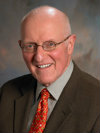 There is something about a Grand Challenge—from climbing Mount Everest to sending a manned mission to the moon to conquering polio—that stirs the imagination and inspires our best efforts.
There is something about a Grand Challenge—from climbing Mount Everest to sending a manned mission to the moon to conquering polio—that stirs the imagination and inspires our best efforts.
So I’m thrilled that the American Academy of Social Work and Social Welfare (AASWSW) is engaging the public in helping to identify the Grand Challenges for Social Work, which it defines as “ambitious yet achievable goals for society that mobilize the profession, capture the public’s imagination, and require innovation and breakthroughs in science and practice to achieve.”
With our new Linking Education to Practice funding portfolio, which aims to improve the health care system and its workforce by integrating the fields of education and practice, we will be very interested to see what they come up with.
Under its Grand Challenges Initiative, the AASWSW is working with social work thought leaders to articulate Grand Challenges for Social Work that will provide a means to focus research exploration and new directions for the profession in the next decade. The Academy will publish the results, and eventually help carry them forward.
 Jim Lubben
Jim LubbenIn order to create “buzz” around this initiative, and make sure the pressing issues facing older adults are considered, the Harford Foundation supported a Grand Challenge Forum at the Gerontological Society of America (GSA) annual meeting in November. Jim Lubben, PhD, project leader of the Hartford Doctoral Fellows Program and John Beilenson, president of SCP, a socially responsible communications firm and Hartford grantee, facilitated the Forum.
The session was open to all health professions. The following suggestions for the Social Work Grand Challenges received the most votes from the nearly 50 participants:
- Design affordable, equitable, accessible and culturally sensitive systems to support choice as we age
- Foster development of livable intergenerational communities across all settings to promote interdependence
- Champion policies and programs that promote strengths and contributions of older adults
- Increase Social Work policy presence to strengthen social protection to eradicate poverty and social disparities
- Create community-based, person centered services to address chronic care and end-of-life care across the life course
- Modernize service delivery systems to be more effective, efficient and culturally sensitive, portable to meet individualized needs.
The participants were encouraged to post their suggestions to the Grand Challenges website and you can check out what others have posted and offer comments
.
I also encourage you to please consider posting your own suggestions related to geriatric social work. For more information, you can download a PDF of the Academy’s Introduction and Context for Grand Challenges for Social Work.
The Grand Challenges Executive Committee will meet early next week to discuss suggestions submitted so far, so please post yours in the next few days so it can be part of that discussion. Ideas will be accepted until a full complement of Grand Challenges are established.
Keep in mind that:
- Challenge must be big, important, and compelling.
- Scientific evidence indicates that the challenge could be solved.
- Meaningful and measurable progress to address the challenge can be made in a decade.
- The challenge is likely to generate interdisciplinary or cross-sector collaboration.
- Solution to the challenge requires significant innovation.
On its site, the Academy has a great quote from aviation pioneer Orville Wright, who, with his brother Wilbur, flew into history by making the first manned powered flight. “If we worked on the assumption that what is accepted as true really is true, then there would be little hope for advance,” Wright said.
Together, let’s ensure that we advance over the next decade on issues related to providing geriatrically competent care to older adults. That would truly be grand!
